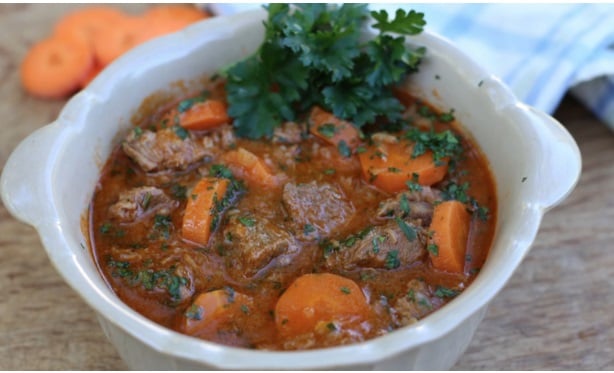GĐXH - Diabetics who consume beef in a balanced and moderate manner will not increase blood sugar because the glycemic index of beef is 0.
Is it good for diabetics to eat beef?
Diabetics can eat beef because it has a glycemic index (GI) of 0. This means that consuming beef cannot cause a sudden increase in blood sugar after eating, providing significant safety for diabetics in daily blood sugar management.
When consumed in a balanced and moderate manner, beef consumption actually brings many good effects to the health of diabetics, because it is an abundant source of protein, vitamins and essential minerals, indispensable for human health.

Illustration
Benefits of beef for diabetics
Helps improve insulin resistance
Beef is a source of high-quality protein, containing all 9 essential amino acids that the body cannot synthesize endogenously and can only be absorbed through the diet.
Research shows that amino acids from beef are an important source of raw materials for the body to repair, restore, enhance or maintain the function of glucose metabolism in cells, helping them absorb glucose from the circulatory system effectively under the guidance of the blood sugar regulating hormone insulin, thereby improving insulin resistance (the main cause of type 2 diabetes) and lowering blood sugar after meals better.
Helps control blood sugar
In fact, the breakdown of fat in the body does not produce glucose at all, so its absorption does not pose a risk of causing increased blood sugar after meals.
On the contrary, the presence of fat also helps slow down the absorption of glucose in the intestine, limiting the sudden increase in blood sugar from consuming other carbohydrate-rich foods after meals.
Helps prevent complications of diabetes
Vitamin B3 is proven to be a nutrient that helps improve blood lipid composition, contributing to a significant increase in HDL cholesterol - good cholesterol that helps reduce the risk of cardiovascular disease, while reducing the synthesis of triglycerides (neutral fat) in the liver, supporting the prevention of fatty liver disease.
This is especially important in the context of cardiovascular disease and fatty liver, two common complications in people with diabetes.
How much beef is enough for diabetics?
Beef contains a lot of saturated and unsaturated fats, if consumed regularly can cause overweight and obesity. At the same time, beef contains a large amount of sodium, causing water retention and edema. Over time, this puts a lot of pressure on the blood vessels, leading to high blood pressure and insulin resistance.
So, to be safe, diabetics should not eat more than 350-500g of cooked beef per week. Do not eat more than 90g per day. If you have consumed more than 70g of beef in one day, eat less or no meat in the following days.
Prioritize simple cooking methods such as steaming, boiling, and stewing. Avoid breading, frying, marinating beef with many sauces, or stir-frying it with a lot of oil.

Illustration
How to eat beef is good for diabetics
- Should be combined with foods rich in fiber: Because beef is a rich source of protein but lacks fiber. Therefore, when eating beef, it should be combined with foods rich in fiber such as green leafy vegetables, tubers, beans and grains...
- Choose lean cuts of beef : such as tenderloin (inner tenderloin, outer tenderloin), shoulder core, flank or beef shank. This helps limit the absorption of excessive saturated fat in meat.
- Limit processed beef: Processed beef such as beef jerky, canned beef, etc. because they can contain a lot of saturated fat, spices, additives, preservatives and sodium, which are bad for overall health.
- Prioritize simple cooking methods such as steaming, boiling, and stewing. Avoid breading, frying, marinating beef with many sauces, or stir-frying it with a lot of oil.
4 groups of diabetics should avoid beef
Diabetics with gout: Beef is red meat and is quite rich in protein, so it can increase uric acid in the blood, making gout worse.
Diabetics with kidney stones: High protein content in beef increases oxalate in urine (a factor in stone formation).
People with diabetes and high blood fat : Beef is high in protein and fat, so it can cause high blood fat. Therefore, people with diabetes and high blood fat eating beef can easily lead to cardiovascular complications.
Diabetics with high blood pressure: Beef contains a lot of sodium, so consuming beef will cause the body to retain water, thereby increasing blood volume and putting pressure on blood vessels. From there, high blood pressure becomes difficult to control.
Source: https://giadinh.suckhoedoisong.vn/loai-thit-giau-dinh-duong-tot-cho-duong-huet-nguoi-benh-tieu-duong-nen-an-de-tang-de-khang-keo-dai-tuoi-tho-172241028114334428.htm


































































































Comment (0)